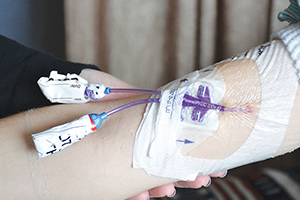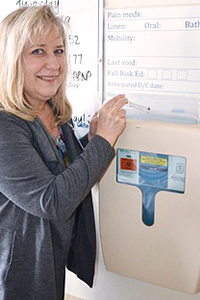By LIZ GARONE
Being admitted to the hospital usually includes a lot of routine paperwork, mostly about financial responsibility and privacy. But at the Providence Regional Medical Center Everett's inpatient unit for patients with substance abuse disorders, patients also are asked to read and sign paperwork of a different kind: a Substance Misuse Partnership Agreement.

Patients in a close-observation unit for people fighting infections related to IV drug use told nurses at Providence Regional Medical Center Everett that an empty syringe, an open IV line or an accessible sharps collection box can prompt drug cravings. Nurses at the Washington state hospital responded by closing IV lines with tamper-resistant tape and disposing of used sharps in a tamper-resistant box.
Wendy Fagan/Providence St. Joseph Health
The unit's nurses wrote and put into place the agreement about four years ago as a way to address ongoing issues with pain management, to keep patients safe, and to make sure that both the staff and the patients are on the same page when it comes to care and following the rules.
"We realized that we weren't doing a very good job of addressing pain management in this addicted population, and we ended up with some very upset patients," said Gale Springer, a mental health clinical nurse specialist and psychiatric nurse practitioner at the Washington hospital. "Nurses didn't understand, physicians didn't understand, and the patients were frustrated."
Managing pain
One change that was implemented as part of the agreement is that pain medications are now given on a scheduled basis as opposed to an as-needed one. For patients dealing with addiction issues, studies have shown that having a regular schedule for medicine creates a lot less stress than not knowing when the next dose will be administered and always having to ask for it.
The agreement also helps the patients understand what is expected of them in the 30-bed close-observation unit. The unit is specifically for IV drug users who are fighting infections, which range from abscesses, often at the injection site but sometimes in the shoulder or the knee joint, to endocarditis, cellulitis, and osteomyelitis, among others.

Pavek
"It allows for an open and honest communication with the patient and the RN while having a clear understanding of the agreement," said Leighann Pavek, a nurse who helped start the unit and is its manager. "Also, the RN is able to assess the patient and set clear expectations for both the patient and staff."
Listen and learn
For a long time, the unit was open all hours for visitors. But after it became clear that the late-night hours were when drug dealers were showing up, visiting hours were restricted to 9 a.m. to 9 p.m., and that was added to the agreement. It has made a big difference in stemming the number of illegal drugs brought into the unit, according to Springer.
Patients are often the best sources for information about how to make the unit a safer place. It turns out that an empty syringe, an open IV line, or an accessible sharps collection box can prompt drug cravings in an IV drug user. The nurses only learned this because patients told them. The sharps boxes since have been replaced by ones that are tamper-resistant and empty syringes are not left lying around. The staff figured out a way to temporarily close IV lines with tamper-resistant tape.

Gale Springer demonstrates a tamper-resistant sharps collection box in Providence Regional Medical Center Everett's close-observation unit. Springer, a mental health clinical nurse specialist and psychiatric nurse practitioner at the Washington state hospital, says the boxes are part of a concerted effort to respect and safeguard patients who use IV drugs.
Much of the unit's success rests on the fact that it is run like a partnership between the nurses and the patients, Springer said. Everyone is treated the same: with respect and without judgment. One way to accomplish this goal has been with this voluntary agreement. But not everyone chooses to sign it. If patients refuse to sign, they can still be admitted to the unit but must verbally agree to abide by the agreement's rules.
Trust and healing
Initially, patients can be a little suspicious when presented with the agreement, according to Pavek. "Some might bristle and fear the staff are going to be punitive or judgmental," she said. "But once the staff continue with their matter-of-fact, therapeutic communication, and gentle understanding, most patients, though they may not overwhelmingly embrace it, do seem to understand that it is in place to help keep them safe."
For Pavek, one of the main things the agreement lets patients know is that she and her staff are not there to judge them and that they are going to treat them the same as they would any other hospital patient. "We are going to make sure that their opinion regarding pain and discomfort are addressed as long as they are honest with us," she said.
People who end up in the unit come from all walks of life, according to Springer. "Drugs don't care if you're rich or poor," she said. The unit does get a lot of low-income or no-income patients since part of the hospital's mission is to not refuse service to anyone who needs it and to get people the help they need.
One of the clearest ways Pavek knows that the unit is fulfilling its mission is the feedback she gets from her patients. She still has the card one patient gave her when leaving the unit. It reads in part:
"Thank you for getting to know me and for taking care of me and easing my way to recovery. I had no direction when I got here to Providence. Now today as I leave here, I have a direction to go. The care and environment and nonjudgmental attitude I received from all of you has given me the strength to do recovery beyond here. Not only have I physically healed here in the last month, I've healed mentally and spiritually."
The agreement already has been shared with other Providence hospitals around the country, and both Pavek and Springer are happy to share it with others. "We just want to get people the help they need," said Springer. "More people out there helping these patients is a win-win."
Substance Misuse Partnership Agreement: For Your Safety
You are being admitted to the hospital for the voluntary treatment of a serious medical issue and have a history of substance misuse. This means for your safety we need to address and treat any potential addiction issues while you are here. We will care for you in a kind, respectful manner without judgment. If needed, we will give you medications to prevent withdrawal symptoms and help manage any pain issues. We have found that some patients with addiction issues bring illicit or unapproved drugs with them to the hospital. They may also arrange to have drugs brought to them in the hospital. The dangers of using illicit drugs along with the medications we give you in the hospital could be deadly. Because of this concern and our goal to keep you safe, we are asking you to sign this agreement.
- I will give all illicit drugs or other medicine I have with me, or on me, to hospital staff. These will either be disposed of or returned to me at discharge.
- I will give all drug paraphernalia, including syringes, foil, spoons, etc. to hospital staff.
- I agree to have my belongings searched to ensure I have no unapproved items.
- I will not use unapproved or illicit drugs while in the hospital or take my medicines in ways not directed by the doctor.
- I will tell staff right away if illicit substances or drug paraphernalia is brought into my room by others.
- I will not manipulate or inject substances into my IV lines, nor tamper with the line. I will avoid all heat sources as the IV caps are flammable.
- I will show the nurse I have swallowed all my medications when they are given to me.
- I will not leave the floor or unit.
- I will not leave against medical advice with IV lines still in place. If I want to leave I will tell the nurse and wait till the IV is removed. I understand I may leave any time.
- If suspicious behavior or physical signs of drug use are observed, I agree to have my room and belongings searched and give urine to be tested for drugs.
- I will treat staff in a respectful manner. I will not threaten them.
- I will participate in setting treatment goals.
- To prevent an infection in my IV line I will bathe daily and wear hospital clothes.
In order to keep you safe and have a successful hospital stay, the nursing staff will:
- Search you and your belongings and remove drug paraphernalia and any potentially dangerous items. Your clothes will be secured on the unit.
- Assess how well your pain or withdrawal medication is working.
- Give oral pain medications in liquid form at scheduled times. We will evaluate this schedule every 24 hours with your doctor.
- Randomly search visitors and any belongings they bring to be sure there is no drug paraphernalia or drugs.
- Have all visitors check in at the front nurse's desk before visiting.
- Educate you and your family and friends (with your approval) about the serious danger and possible death that may occur if you take any additional, illicit, or unknown drugs while you are being given pain medicines or withdrawal medications.
- Make sure all your medications are swallowed. We may ask you to stick out your tongue and take a drink of water each time you are given medications.
- Keep all syringes outside of your room (unless we are using them at that time) to help decrease the chance of triggering a craving episode.
- Help you arrange chemical dependency treatment if desired.
- Allow visiting hours only from 9:00 a.m. - 9:00 p.m.
The following may occur if this agreement is not kept:
- Visitors may be limited to your immediate family or may be restricted entirely.
- Use of the hospital or cell phone may be restricted.
- You will not be able to leave your room alone.
- Random urine drug screens and room searches will occur.
- Any visitor caught bringing illicit drugs into the hospital will be prosecuted to the full extent of the law.
- Possible discharge from the hospital.
Name: _________________________
Date: ___________________
Reviewed by: ____________________
Date: ___________________
I have reviewed the attached Substance Misuse Partnership Agreement for patients with substance misuse with staff and agree to all the terms. I understand these interventions are being done for my safety. I have had the opportunity to ask questions and have had my questions answered.